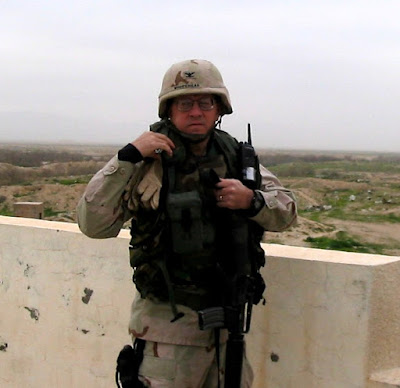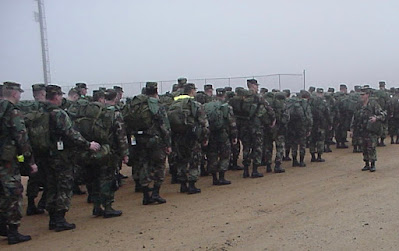“From: Whitehead, Michael (USA)
Sent: Friday, February 13, 2004 10:22 AM
Subject: Looking at Iran
On Feb 11 we made our long planned and once canceled visit to the Iran/Iraq border. One of the three major crossing points from Iran into Iraq is in our sector in Wasit province, just north of Al Kut. We had heard many times concerns from many people, including Iraqis, about the lack of controls at the border. We decided to travel to the border to investigate ourselves.
 |
| At the Iraq/Iran border. In the background are the mountains of Iran. |
The visit called for traveling to Al Kut, spending the night there and then leaving for the Border the next day. While we were there, we linked up with Timm Timmons, the Deputy Governate Coordinator. Timm traveled with us to the border and was our guide. Timm is the lone American State Department officer in an office of British Foreign Office people. In fact, COL Strong and I call the Governate Coordinator, Mark Etherington, the Viceroy and Wasit the New Outpost of The British Empire.”
“The next morning we headed north for the border… The day we went to the border was windy and cold, with occasional drops of rain. In front of us and flowing toward us was a never ending stream of large 44 passenger buses and smaller minivans with luggage piled on racks on the roofs. They were all full of people flowing to and from the border.”
“Finally, through the haze of this blustery day, I saw them – the mountains of Iran. When we arrived at the border I saw a scene out of the television news, or a movie. The scene resembled the fevered chaos and organization of an ant colony. No vehicles could cross the border, so there was a laborious process of unloading the baggage from the vehicles on to carts for the walk across the border. Numerous men hired out themselves and their carts for this service. In some of the carts were even old women and children. The road in front of us filled with carts, pedestrians, vehicles and border guards frantically trying to clear a path for our vehicle. For some reason in this culture otherwise indolent police or security officials will spring into action at the sight of a Coalition vehicle, especially if it involves ordering other Iraqis out of our way.
The Iraqi Customs building was built in the shape of a little fort, with turrets. The Customs Director spoke English, and briefed myself, COL Strong and Timm Timmons on his situation. He had a list of complaints and items he needed which he immediately supplied to Timm. The Director said that he was stamping passports. I wanted to see the process and Timm did too, so we walked out of the building and toward the border. The crossing was a cut in the land about the size of a two lane road, with a strip of barbed wire down the middle. On the right a stream of people walked toward Iran. On the left, a stream of people came into Iraq. We followed the stream toward Iran.
After 75 meters we came to a mud hut about the size of our bathroom. Inside were a wooden table and one Iraqi Customs official with a date stamp. If you wanted your passport stamped he would do so, but only a few applied for this service. No one was checking the baggage. Some of the people coming into Iraq were refugees who had fled Saddam. They had no passports, and were very happy to see Col Strong's and my uniform. To a number of people I pointed to the flag on my right shoulder and they nodded happily. COL Strong took a picture of a family walking by, and then showed the digital image to them, to their great delight. Timm did not dress for the weather, and was freezing, so we headed back. As I looked back, I could see about 200 meters away the Iranian border crossing point.
 |
| Lt Alicia Galvany and I at the “passport office” on the Iraq/Iran border. |
While I was away, my troops had made friends with the Iraqi border guards, who had not been paid for five months. They posed for pictures. Before we left, we gave them a case of our MRE's to eat. On the way out the road turned into Iraqi gridlock, as it has in so many other places in Iraq. As I had done before in such situations, I got out of the vehicle and walked forward, pistol in hand, to clear a path through the ant bed. I led both vehicles out of the confusion and then got back into my seat for the trip back to Hillah.
A memorable day.”
 |
| Colonel Bede Strong, of Her Majesty’s Army, and I on the banks of the Tigris River in Al Kut, Iraq. This was our last visit to that city |
Excerpt From
Messages from Babylon
Michael Whitehead
https://books.apple.com/us/book/messages-from-babylon/id407775151
This material may be protected by copyright.











